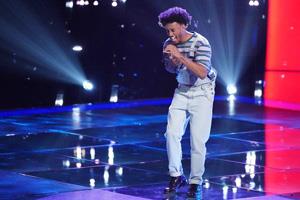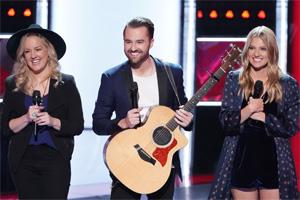I’m not enjoying The Voice this season — not so far, anyway. They say numbers don’t lie, and there’s no evidence yet to suggest other viewers are losing interest. The Voice still tops the ratings charts, and comfortably, both on the night and on the week.
And yet. . . . Little things are starting to bother me.
These are the blind auditions, normally my favorite part of the season, for the unpredictability and those wonderful moments of discovery. We know next-to-nothing about the contestants, and the coaches know even less — because their chairs are turned away and they can’t see the performers. Those of us watching at home not only get to see the performers as they’re announced; we also get to see the back story about where the singer came from and the obstacles they’ve had to overcome along the way. (It’s taken on faith with all these reality shows that any contestant worth thinking about has to have faced a serious life challenge. Think of it as “the Simon Cowell effect,” going back to Cowell’s early producer days on the original American Idol.)
The Voice has the ratings, the Emmys and even a Television Critics Association award or two — so why the need to play games?
Where tweaks to the format have worked in the past — the “steal,” “the coaches’ save,” etc. — now the tweaks seem arbitrary and, in the case of the “block” (in which each coach is given the ability to block another coach’s interest in a prospective singer) annoying and mean-spirited.

There was a moment, during the season premiere, when contestant Domenic Haynes (right), who had earned an early two-chair turn, had to keep singing while the remaining coaches chattered and giggled among themselves that newcomer John Legend, one of two coaches to turn his chair for Haynes, was unaware he’d been blocked. At one point, fellow coach Kelly Clarkson began giggling and chattering excitedly so loudly it sounded as if she was drowning out the singer. (That may have been the way the sound was recorded for the TV broadcast, but still.) It was distracting. Distracting and disrespectful. Disrespectful to the singer, Haynes, and disrespectful to the viewers watching at home that actually care about the singing. The Voice is about finding the next great singer, not whether Clarkson is entertained enough to talk over people and laugh merrily away.
Some seams were already starting to show, of course. The budding bromance between frenemies Adam Levine and Blake Shelton got tired long ago, and to grumble about it now is a little like complaining about a broken record you know is broken before you play it. The difference now is that standard lines like Shelton’s, “Let me be a part of this historic journey,” are really starting to grate. At best, it’s a reminder of just how overused the word "journey" is, not just in The Voice but in all these reality programs. At worst, it’s an admission that even Shelton, a Voice original dating back to the show’s inception in April 2011 and one of its most vocal boosters, might be getting tired of the whole process. Tired enough, anyway, not to think of anything new to say when he’s trying to win over a singing prospect.

A more serious problem for The Voice moving forward — this season as in any other recent season — is that when it finally gets to the audience vote, it’s clear that viewers tend to vote by genre and who they like, rather than vocal ability. It’s no accident that, after 16 seasons (or cycles), I can’t think of a single soul singer or arena rocker who has won The Voice, or even come close, whereas a country cowboy with a 10-gallon hat and a 10-pound beard is virtually guaranteed a pass into the final four. March madness, country-Voice style.
Another annoying gimmick: the duos. In this season’s blind auditions so far, there’s even been a trio (above). That’s not just unfair to the solo artists, it seems to me — duos are about harmony, not solo performance — but when it comes to the battle rounds and, assuming the duos get that far, the knockout rounds, the result can be chaos, like a boxing bout where a boxer is expected to box two other fighters at the same time.
Yes, some of the newer tweaks do work. The YouTube “Comeback Stage,” in which promising singers who didn’t get a single chair turn are offered a chance to get back into the competition through the back door, in a YouTube-only competition. Even that, though, seems like an admission that something about the Voice process isn’t quite right.
It’s easy to forget that 16 seasons is a lot. No show — except perhaps Game of Thrones — is going to seem as fresh and energizing as the first time you saw it.
A show like The Voice, which is ostensibly about finding the Next Great Thing, seems designed to reinvent itself every year. No one singer can win more than once, after all.
As often happens in TV, what’s good in theory is not how it works out in practice.
I may be wrong, but even though the ratings seem solid for now, I can’t help but wonder if this is the beginning of the end for The Voice.
After all, it happened with American Idol.